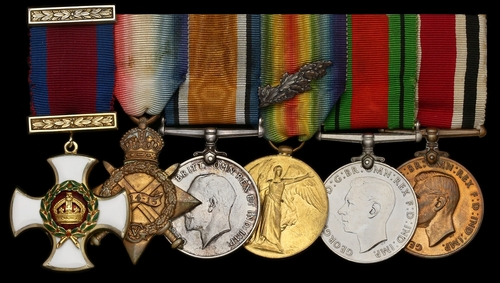
Auction: 25002 - Orders, Decorations and Medals
Lot: 174
A Great War D.S.O. group of six awarded to Assistant Chaplain-General R. C. L. Williams, Royal Army Chaplains' Department, who further took a brace of 'mentions' and was reputed to have taken his decoration whilst taking up arms on the Somme in 1916
Distinguished Service Order, G.V.R., silver-gilt and enamel, the reverse of the suspension bar named 'R. C. L. Williams', top riband bar adapted for mounting; 1914-15 Star (Rev. R. C. L. Williams. A.C.D.); British War and Victory Medals, with M.I.D. oak leaves (Rev. R. C. L. Williams.); Defence Medal 1939-45; Special Constabulary Long Service, G.VI.R. (Ronald C. L. Williams), mounted as worn, good very fine (6)
D.S.O. London Gazette 1 January 1918.
M.I.D. London Gazette 1 January 1916, 24 December 1917.
Ronald Charles Lambert Williams was born at Kensington, London on 26 July 1881, the son of Alfred Charles Williams and Marian Williams of Handsworth, Birmingham. Educated at St Laurence College and at Westward Ho!, he studied for his B.A. at Peterhouse College, Cambridge from September 1900-04. He was ordained in 1905 and became a deacon that year, becoming a priest the following year. Williams joined the Army Chaplain’s Department on 20 October 1907 as Chaplain to the Forces, 4th Class, serving at Shorncliffe (1907-09), Ricasoli, Malta (1909-10), Aldershot (1910-12) and as Chaplain of the Duke of York’s Royal Military School, Dover, between 1912-14.
With the outbreak of the Great War, he was then selected for active duty on the Western Front as Chaplain to the 18th Infantry Brigade, 6th Division, being landed on 20 December 1914. Remaining in that post until 16 May 1915, he then undertook a role as Senior Chaplain at Etaples. Returned to active service as Senior Chaplain to the 17th Division, B.E.F. on 31 July 1915. He served at Ypres, and by family repute, he took part in the following incident, as recalled by a family member:
'As far as I can remember his citation for the award of the D.S.O. told that on the night of 4 June 1916, during the battle of the Somme, he was attached to The Royal West Kents…and a detachment of thirty odd men were held up in a copse by German snipers...he had been with this detachment, and had managed to reach our lines under cover of darkness, but on arriving in his trench to his dismay he found that half a dozen of the men had not followed him....it turned out that their one remaining officer had lost his nerve......my uncle told his commanding officer that he would go back at once and collect the bugger! This he did, and as dawn broke he stood up on the trench and told them all it was time to go home and would they please follow him (or words to that effect!)…and off he went, but to his dismay none of them moved. So, he took the revolver out of the officer’s holster, and fired it into the air three times, shouting "Let God arise and his enemies be scattered!” And they were! This time, on arriving back in his own trench he lay down and promptly went to sleep, only to be woken by the Colonel to say he had broken the Geneva Law by being a Chaplain carrying a fire arm, and he would be charged accordingly! General Haig apparently dropped the charge, and he was awarded with the DSO.'
Further study would surely uncover this story. In any case, Williams continued in the service and he undertook a number of positions in major areas such as Etaples, Calais and Le Havre, being appointed temporary Chaplain to the Forces 2nd Class on 25 September 1917. He served with the Mesopotamian Expeditionary Force as Principal Chaplain from 4 January-2 July 1919. Returning to civilian life, he took up the following positions as Vicar of Melville with Brixton, Johannesburg, South Africa, 1921-24; at St Mary Abbot's, Kensington, 1926-28; as Chaplain (Mission to Seamen) at Newport, Monmouthshire, 1928; Organising Secretary (West Central district), 1928-37; for South-East district, 1940; Gibraltar, 1937-38; and Chichester, Canterbury and Rochester, 1939-46.
With the outbreak of the Second World War, he was sworn in as Special Constable in Bexhill on Sea in 1939, and later was Reverend of Alberbury with Cardiston, Salop, 1946-48. The gallant Chaplain died at Bexhill in April 1963.
Subject to 20% VAT on Buyer’s Premium. For more information please view Terms and Conditions for Buyers.
Sold for
£1,500
Starting price
£800




